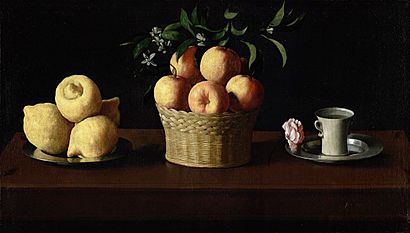Still Life with Lemons, Oranges and a Rose facts for kids
Quick facts for kids Still Life with Lemons, Oranges and a Rose |
|
|---|---|
 |
|
| Artist | Francisco de Zurbarán |
| Year | 1633 |
| Medium | Oil on canvas |
| Dimensions | 62.2 cm × 107 cm (23.6 in × 42.1 in) |
| Location | Norton Simon Museum, Pasadena |
Still Life with Lemons, Oranges and a Rose is a famous painting by the Spanish artist Francisco de Zurbarán. He finished this artwork in 1633. It is painted with oil on a canvas, which is a type of strong cloth. You can see this beautiful painting today at the Norton Simon Museum in Pasadena, California. It is a very important piece because it is the only still life painting that Zurbarán signed and dated himself. Many people consider it one of the best examples of a still life painting.
Contents
Who Was Francisco de Zurbarán?
Francisco de Zurbarán was a very important Spanish painter. He lived from 1598 to 1664. He was part of the Baroque art movement, which was popular in Europe during the 17th century. Baroque art often showed strong emotions, dramatic lighting, and rich colors.
Zurbarán was especially known for his religious paintings. He painted many pictures of monks, saints, and scenes from the Bible. He was also very good at painting fabrics and textures. This made his paintings look very real.
What is a Still Life Painting?
A still life painting is a type of art that shows objects that do not move. These objects are usually things you find around a house or in nature. They can be fruits, flowers, food, books, or even everyday tools. Artists arrange these items in a special way to create a pleasing picture.
Still life paintings became very popular in the 17th century. They allowed artists to show off their skills in painting different textures and light. They could also use these objects to tell a story or share a hidden meaning.
Looking Closely at the Painting
Still Life with Lemons, Oranges and a Rose is a simple yet powerful painting. It shows three groups of objects placed on a dark wooden table. The background is very dark, which makes the objects stand out even more.
The Lemons
On the left side of the painting, there are four bright yellow lemons. They are placed in a silver plate. The lemons look very real, and you can almost feel their bumpy skin. The artist used light and shadow to make them appear round and solid.
The Oranges
In the middle of the painting, there are several oranges. They are placed in a woven basket. Some of the oranges still have their leaves attached. The basket looks like it's made of natural fibers. The oranges have a warm, inviting color.
The Rose
On the right side, there is a single pink rose. It is placed next to a cup of water. The rose looks delicate and fresh. The cup is simple and reflects a little bit of light. The rose adds a touch of beauty and softness to the scene.
Why is This Painting Special?
This painting is special for several reasons. First, it is the only still life that Zurbarán signed and dated. This shows that he was proud of it. Second, the way he painted the objects is amazing. He made them look incredibly real. The light in the painting is very dramatic. It highlights each object and makes it seem almost glowing.
Some art experts believe the objects in the painting might have a deeper meaning. For example, the lemons, oranges, and rose could represent different stages of life or even religious ideas. However, Zurbarán himself never explained any hidden meanings. This allows viewers to think about the painting in their own way.
Where to See It
Today, Still Life with Lemons, Oranges and a Rose is a prized artwork at the Norton Simon Museum in Pasadena, California. It is part of the museum's permanent collection. This means you can visit the museum and see this famous painting in person. It's a great example of Spanish Baroque art and a masterpiece of the still life genre.
See also
 In Spanish: Bodegón con cidras, naranjas y rosa (Zurbarán) para niños
In Spanish: Bodegón con cidras, naranjas y rosa (Zurbarán) para niños
 | Claudette Colvin |
 | Myrlie Evers-Williams |
 | Alberta Odell Jones |

